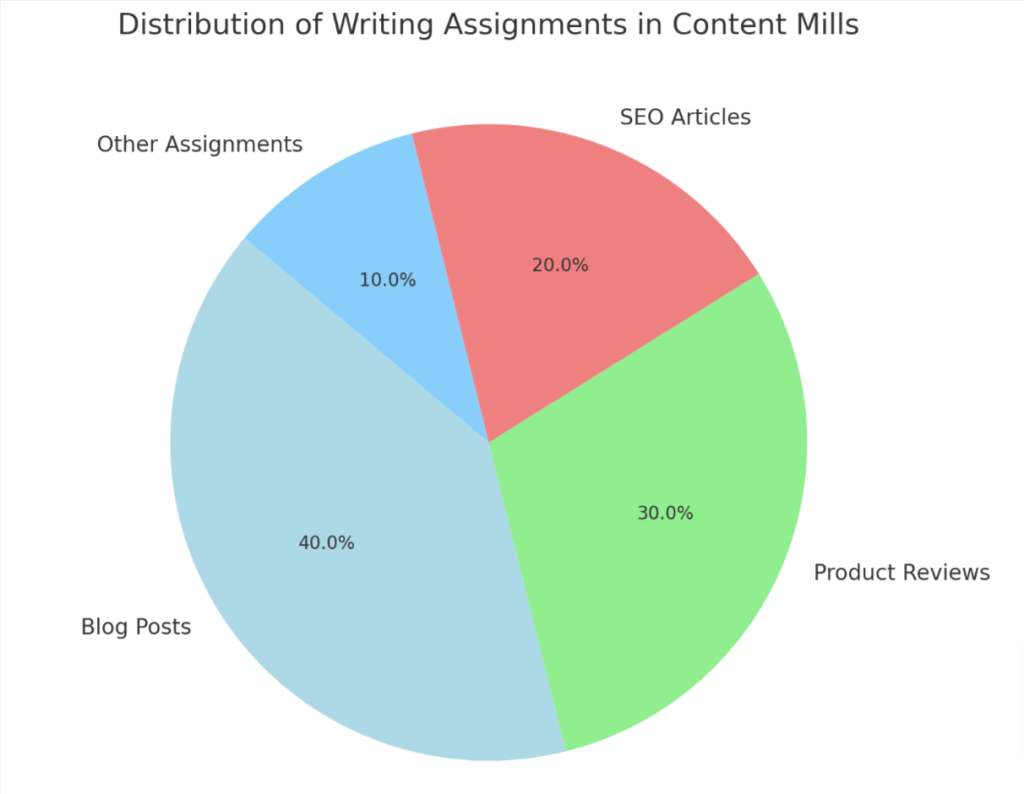Understanding Content Mills: The Freelance Writing Factories
Are you a freelance writer trying to navigate the often confusing world of online content creation? You may have encountered something called ‘content mills’ in your search for gigs.
In this article, we’ll demystify what content mills are and illustrate how they operate within the realm of freelance writing. Let’s dive into it and empower your decisions as a writer!
Key Takeaways
- Content mills are platforms where freelance writers can find work by producing high volumes of content for clients at cheap rates.
- These platforms prioritize quantity over quality, resulting in low – quality articles and blog posts that do not meet marketing goals.
- Writers on content mills often face unfair payment rates, limited growth opportunities, and a lack of support or care from the platform.
What Are Content Mills?
Content mills are platforms where freelance writers can find work by producing high volumes of content for various clients, such as blog posts and articles, often at cheap rates.
Definition and examples
Content mills, often identified as writers’ factories, churn out high volumes of content at a low cost. For instance, platforms like Fiverr and PeoplePerHour have earned this tag due to their business model where large amounts of blog posts and articles are generated for clients at cheap rates.
Writing samples obtained from these types of sites commonly fit the mill description: they prioritize volume over quality. Often, businesses sourcing content from such places receive generic pieces written hastily rather than personalized narratives tailored specifically for them.
The term ‘content mill’ is somewhat slang, giving an idea about the mechanical approach towards writing; much like products coming off a conveyor belt in a factory.
Why You Should Avoid Content Mills
Content mills produce low quality content, unfair payment for writers, limited growth opportunities, and lack of care for writers. This depreciates the value of both writers and content.
Read on to learn more about why you should steer clear of content mills.
Low quality content
Content mills often produce low quality articles and blog posts. This is because they focus on high volumes of content at cheap rates, rather than aiming for well-researched, engaging writing.
The writers, typically freelancers attracted by the promise of a steady stream of work, are pushed to churn out article after article with minimal time for thorough research or thoughtful editing.
As a result, the finished product may be riddled with inaccuracies, filler text and sloppy workmanship; anything that could detract from reader engagement and learning. Client businesses are thus provided with lackluster content that does little to boost their online presence or meet their marketing goals.
Unfair payment for writers
Content mills often pay writers at rates far below what their work is actually worth. Each writer’s effort, talent, and time are undervalued as they churn out content for measly sums.
Many mills exploit the pressure freelancers feel to keep money coming in by setting extremely low pay rates. This unfair payment system forces many gifted wordsmiths to overwork just to make ends meet.
Sadly, this not only strains writers physically and mentally but it can also hinder their creative process leading to subpar output. The result? They end up trading quality writing for quantities of mediocre content.
Limited growth opportunities
Content mills offer limited growth opportunities for freelance writers. These platforms often prioritize quantity over quality, focusing on churning out high volumes of content at cheap rates.
As a result, there is little room for personal and professional development as a writer. Freelancers may find themselves stuck in a cycle of writing blog posts or articles that do not challenge their skills or allow them to explore new topics.
While content mills may provide some initial opportunities for work, they typically lack the potential for career growth and advancement that can be found elsewhere in the freelance writing industry.
Lack of care for writers
Content mills often demonstrate a lack of care for their writers. Many content mills prioritize high volumes of content over quality, which can be demoralizing for writers who take pride in their craft.
These platforms often pay low rates to writers and may even engage in unfair payment practices, such as withholding payments or not compensating for revisions. Additionally, content mill platforms typically provide limited growth opportunities for writers, making it difficult to advance or develop new skills.
Overall, the lack of care shown towards writers by content mills depreciates the value of both the writers and the content they produce.
Depreciates value of writers and content
Content mills contribute to the depreciation of both writers and the content they produce. By offering extremely low rates for articles and blog posts, these platforms undervalue the skills and expertise of freelance writers.
This not only leads to financial instability for writers but also encourages a race-to-the-bottom mentality when it comes to pricing. The constant demand for high volumes of content at cheap rates devalues the quality and creativity that skilled writers bring to their work.
As a result, both writers and their content are seen as disposable commodities rather than valued contributors in the realm of online content creation.
How to Identify a Content Mill
Look out for signs like low payment rates and limited growth opportunities. Find examples of content mill characteristics to be aware of. Interested in learning more? Keep reading!
Signs to look out for
Content mills can be easily identified by certain signs. Some key indicators include:
- Cheap Rates: Content mills often offer extremely low pay for writing assignments, sometimes as low as a few cents per word.
- High Volumes of Work: These platforms focus on producing large quantities of content quickly, leading to a high demand for writers.
- Lack of Client Interaction: Writers on content mills usually have limited or no direct contact with clients, relying solely on the platform for communication.
- Limited Quality Control: Content mills prioritize quantity over quality, resulting in lower standards for the content produced.
- Limited Editorial Support: Writers may receive minimal or no editing support from the platform, which can result in subpar content.
- No Recognition or Attribution: Content produced through a content mill is often published anonymously or credited to someone else.
- Strict Deadlines: Content mills typically impose strict deadlines on writers to churn out articles quickly, leaving little room for creativity or research.
- Anonymous Job Boards: Many content mills advertise their writing assignments through anonymous job boards rather than personal connections or referrals.

Examples of content mill characteristics
Content mills can be identified by certain characteristics that set them apart from other writing platforms. For example, content mills often offer low rates to writers in exchange for high volumes of work.
They operate as a job board where clients post requests for blog posts or articles, and freelance writers are expected to produce content quickly and at a cheap rate. These platforms prioritize quantity over quality, often resulting in poorly written pieces.
Additionally, content mills typically lack personal interaction between writers and clients, treating freelancers as mere providers of text rather than valued professionals. This impersonal approach can lead to limited growth opportunities and a lack of care for the well-being of writers.
Alternatives to Writing for Content Mills
Build your own writing brand, find clients without content mills, and utilize professional outreach services. Expand your opportunities and avoid the pitfalls of content mills by exploring these alternative avenues for freelance writing success.
Building your own writing brand
Establishing your own writing brand is a powerful alternative to working with content mills. By building your brand, you can take control of your writing career and increase your earning potential.
Create a professional website or portfolio showcasing your work, network with other writers and industry professionals, and actively market yourself on social media platforms. Develop a unique voice and style that sets you apart from others in the field.
With dedication and persistence, you can establish yourself as a reputable writer and attract clients who value quality content.
Finding clients without content mills
Many freelance writers may be wondering how to find clients without relying on content mills. Here are some alternatives to consider:
- Building your own writing brand: Create a professional website or portfolio to showcase your expertise. Market yourself through social media, networking events, and word-of-mouth referrals.
- Utilizing professional outreach services: Join online communities or platforms specifically designed for connecting writers with potential clients. These platforms often provide job listings and opportunities for direct client engagements.
- Networking with businesses: Attend industry conferences or join relevant professional organizations to meet potential clients and establish valuable connections.
- Pitching article ideas to publications: Research magazines, newspapers, or online publications that align with your niche and pitch article ideas directly to their editors.
- Collaborating with other professionals: Partner with graphic designers, web developers, or marketing agencies who may need quality written content as part of their client services.
- Creating an online presence: Start a blog or contribute guest posts to reputable websites within your industry. This can help you build credibility and attract potential clients who appreciate your writing style and expertise.
- Nurturing existing relationships: Don’t underestimate the power of repeat business and client referrals. Provide exceptional service to your current clients so they will continue working with you in the future and recommend you to others.
- Reaching out to small businesses: Many local businesses may not have the budget for content mills but still require professional writing services. Approach them directly with a well-crafted pitch highlighting the benefits they can gain from hiring you as a writer.
Utilizing professional outreach services
Utilizing professional outreach services can be a great alternative to writing for content mills. These services connect freelance writers with businesses in need of high-quality content.
By using these platforms, writers have the opportunity to work directly with clients and negotiate fair rates for their work. This not only allows for better compensation but also opens doors for building strong relationships and finding growth opportunities in the industry.
Furthermore, working with professional outreach services ensures that your skills as a writer are valued and appreciated, which is often lacking in content mill environments.
Conclusion
In conclusion, content mills are platforms that connect freelance writers with businesses looking for cheap and high volumes of content. Writers often face low pay rates, limited growth opportunities, and a lack of support or care.
It’s important for freelancers to beware of these mills and consider alternative ways to build their writing brand and find clients outside of these platforms.

